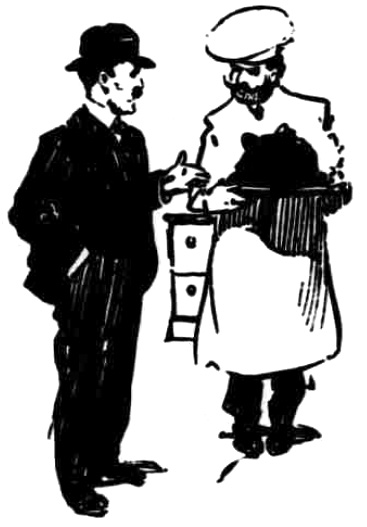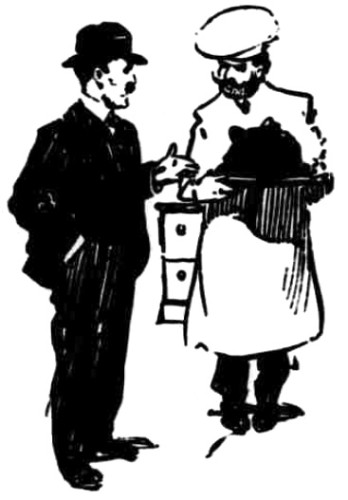The following is the final excerpt of an article which first appeared in 1905 in the St. Louis Republic. Check out the first, second, third, fourth, fifth and sixth parts for the full story.
When the curtain has descended after the last encore, “Strike” commands the stage manager, and in a jiffy, the village street is transformed into a camp on the plains. As soon as the main pieces are set, the property man is out in front distributing about the little things he carries in his clothes. The army blanket is spread out and tin plates, battered and smokey, are thrown around in artistic confusion. Out of one pocket McCarrick pulls a deck of cards and lays out a trio of poker hands. Money and chips are piled up at the proper spot. From another pocket comes a newspaper, and from still another he draws a pencil, without which the climax of the act would be a failure. All of these things he has prepared with as much diligence and care as though he were arranging the crown for the coronation of an emperor. If he did not he would probably lose his job.
He is the first man on the stage after the curtain has been rung down and gathers up his precious possessions with the same system and care with which he laid them out. Back into the trunk they go, in perfect order, and after careful inventory has been made. The next performance finds them just as they were left and already for the show to begin.
McCarrick has been in the business for twenty-three years as a property man. He started by accident as a helper to the property man in a New York theater. Two weeks later his boss made a fatal slip, which ruined the climax of the whole play, and McCarrick got his job at once and he has been in the game ever since. He has been with many of the most prominent theatrical organizations which have toured America, and has crossed the continent repeatedly. So constant has been his work that it has become second nature with him to learn the book of the play with which he is connected, and every line and every cue is as firmly fixed in his memory as it is in the gray matter of the stage manager and of the performers themselves.
Many have been the close shaves he has had caused by missed railroad connection or delays in securing needed articles, and his store of thrilling and amusing anecdotes of his quarter century behind the scenes is wonderfully interesting.
He has the figures for being about as important personage as any one connected with the theatrical world, and in quiet modesty bears the pressing duties which are his.
Originally published in The St. Louis Republic, January 1, 1905.


